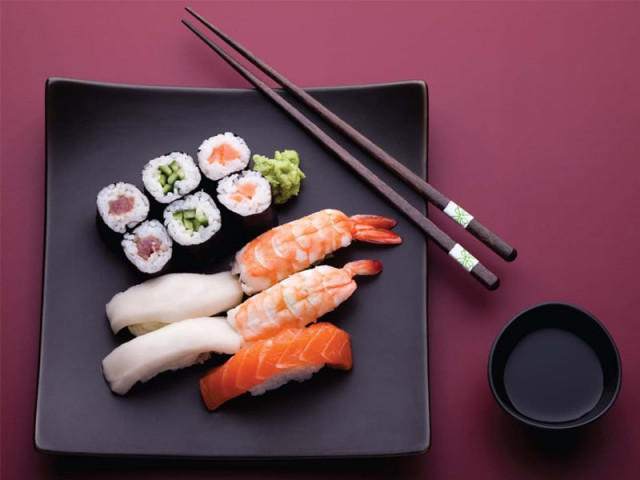Sushi: Evolving tastes
Will sushi soon become a staple in our diets?

As the weather began to turn deliciously nippy last month (usually a signal for Lahoris to head towards Mozang and give in to their fish cravings), one observed the launches of two sushi places: the famed Sakura of the Pearl Continental and Wasabi, a home delivery sushi service, both held within a span of a week. One couldn’t help but think then, if sushi, like pizza, would soon become a staple in our food markets, being sold ubiquitously in college canteens, office cafes and the road side restaurants as a quick ‘fast food’ meal?
Most desis living abroad issue stern warnings; “Don’t eat Japanese food in Pakistan. It is horrid and unauthentic,” says young Harvard graduate Maliha Khan. And given the awful offering that Sakura in Lahore made at its launch, Khan just might be right. Likewise, Saad Furrukh Akhtar, media specialist, a Karachiite now living in Lahore, makes a very interesting point; “We really aren’t a fish eating nation. Despite being a coastal city, Karachi people don’t eat as much fish as they should.” Akhtar is of the opinion that places like Kamameshi and others (in Karachi) have existed for quite some time, yet they aren’t that popular. Indeed one can count the restaurants offering Japanese food on their fingertips: Sakura at the Pearl Continental, Oishi Sushi at Port Grand and Fujiyama at the Avari. Given the posh locales in which these restaurants are situated, and the steep prices (nearly Rs1,500 per head), it comes as no surprise that only a small section of the elite have developed a taste of sushi and frequent these eateries.
“Developing a taste of any kind of food depends upon exposure,” states Akhtar. “Sushi in Pakistan is the ‘rich man’s food’ because it’s expensive and its exposure is confined.” But once a upon a time — in the early 1990s to be precise — pizza carried a similar label when the global behemoth Pizza Hut came to town and now at least three places will be selling their own version of the Italian dish in every neighbourhood’s back alley. “Pizza’s trajectory has been successful because Pakistanis could associate the food with the cartoons Teenage Mutant Ninja Turtle — a whole generation grew up on these cartoons,” states Akhtar.
Ahmed Cheema, a chef known for his Mughali restaurant Andaaz in Lahore, also defends the pizza, stating, “It was bound to work with its close associations with our local qeema naan. Sushi, however, is raw fish and Lahoris are not a fish eating people. The fish that is sold in our markets is cooked to the extent that all its natural flavours are depleted. It basically tastes like chicken.”
However, Karachi-based chef Poppy Agha, whose claim to fame has been fusion food, claims that Pakistan is a fish eating nation, citing the dwindling stocks of trout. “The concept of raw fish is new but cooked fish is very popular. But since sushi is a raw entree and our palates aren’t that diverse, it will take time for us to acquire the taste for it,” says Agha.
Despite the failure of Lahore’s last sushi bar, Shun, Cheema is confident that people’s tastes will evolve and new kinds of food like sushi will make way in the mainstream market. Also given that Karachi’s latest food street, Port Grand, also boasts a modest but quite up-to-the-mark Japanese joint Oishi Sushi, the day might not be far when sushi bars will pop up along places like Boat Basin and MM Alam Road as well.
Published in The Express Tribune, November 14th, 2011.



















COMMENTS
Comments are moderated and generally will be posted if they are on-topic and not abusive.
For more information, please see our Comments FAQ